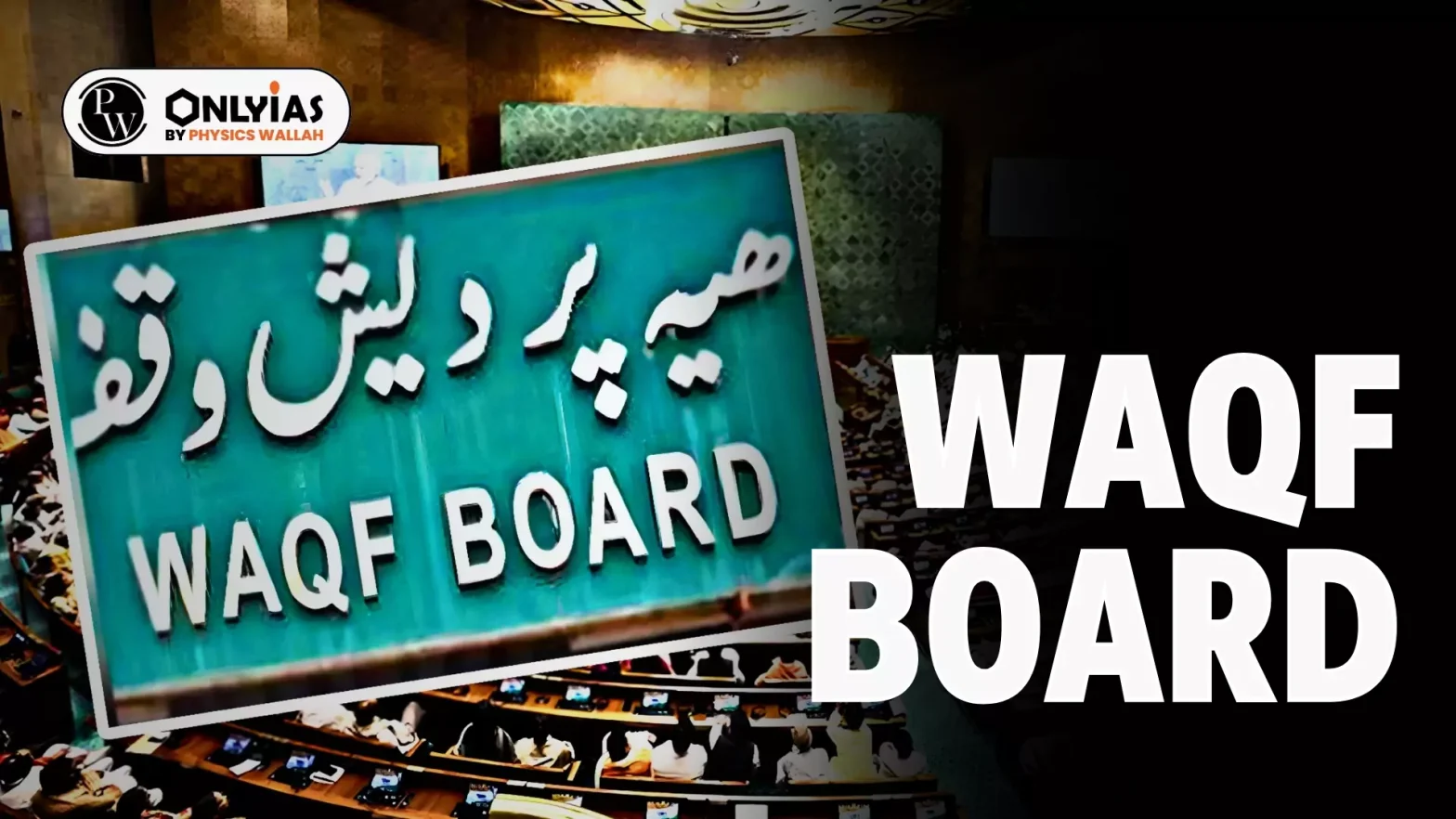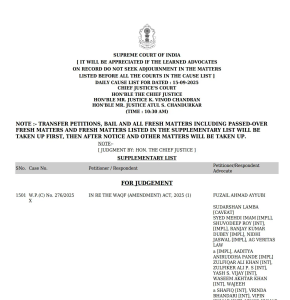A Waqf Board is a legal entity responsible for managing and overseeing waqf properties dedicated to religious, pious, or charitable purposes under Islamic law. Keep on reading to learn more about the Waqf board.

Waqf board is again in talks after the news that the Central government is likely to propose the bill to amend the Waqf Act. The Waqf Board plays a significant role in the management and administration of waqf properties in India. A waqf is a permanent dedication of movable or immovable properties for religious, pious, or charitable purposes as recognized by Muslim law. Get a comprehensive overview of the Waqf Board, its establishment, governance, and key functions here.
The key points from the interim order passed by the bench of Chief Justice of India BR Gavai and Justice AG Masih are as follows:

In a significant move that has sparked widespread debate, Parliament has passed the Waqf Amendment Bill, 2025, with the Rajya Sabha clearing it in the early hours of Friday following an intense 13-hour debate. The Upper House voted 128 in favour and 95 against, while the Lok Sabha approved it earlier with 288 votes for and 232 against.
The Waqf (Amendment) Bill 2025 seeks to modernise and streamline the administration of Waqf properties across India. It introduces provisions aimed at transparency, accountability, and inclusivity, while also safeguarding heritage sites and promoting social welfare, especially for economically vulnerable Muslim communities, including widows and divorced women.
Documentary Requirement for Waqf Claims: Waqf Boards must now furnish valid documentation to claim a property as waqf, a departure from past practices that recognized oral declarations and community usage.
Judicial Oversight: The Bill allows judicial intervention in waqf disputes, replacing the earlier system where decisions by Waqf tribunals were final.
Centralised Registration: A six-month deadline has been set for registration of all waqf properties under a centralised system, improving oversight and transparency.
Role of Government in Disputes: In cases involving contested lands, particularly where the government lays claim, the final decision will rest with government authorities.
Non-Muslim Representation: For the first time, non-Muslims will be allowed on Waqf Boards and in tribunals, though their numbers are restricted to ensure minority representation remains intact.
Inclusivity Measures: The Central Waqf Council will comprise 22 members, with no more than four non-Muslims, while only three out of eleven members of a State Waqf Board may be non-Muslim.
Minority Affairs Minister Kiren Rijiju defended the Bill, stating it is a pro-poor and pro-reform legislation designed to benefit marginalized Muslims, including the Pasmanda community. He assured that it does not infringe upon Waqf rights or property and emphasized the government’s commitment to “Sabka Saath, Sabka Vikas”.
Prime Minister Narendra Modi, reacting after the passage of the Bill, called it a “watershed moment”. He stated, “The passage of the Waqf (Amendment) Bill and the Mussalman Wakf (Repeal) Bill by both Houses of Parliament marks a watershed moment in our collective quest for socio-economic justice, transparency and inclusive growth.”

The Bill was met with strong resistance from opposition parties, who termed it unconstitutional and anti-minority.
Mallikarjun Kharge, Leader of the Opposition in Rajya Sabha, accused the government of adopting a “negative stand” and bypassing consensus-building.
Dr. Syed Naseer Hussain (Congress) labelled the Bill as misleading and designed to polarize communities.
Tiruchi Siva (DMK) and Mohammad Nadimul Haque (TMC) criticised the Bill for being anti-secular, while Sanjay Singh (AAP) urged for its withdrawal, calling it unconstitutional.
Prof. Manoj Kumar Jha (RJD) questioned both the intent and impact of the Bill.
Despite the pushback, the government maintained that it had incorporated suggestions from the Joint Parliamentary Committee and conducted widespread consultations with stakeholders.
Parliament also passed the Mussalman Wakf (Repeal) Bill, 2025, which officially repeals the Mussalman Wakf Act, 1923. This Act previously governed certain categories of waqf properties not covered under the Waqf Act, 1995. The repeal is part of the government’s broader effort to simplify and consolidate waqf laws under a single, unified framework.
A Waqf Board is a legal entity responsible for managing waqf properties and ensuring their use for intended religious, pious, or charitable purposes. The term “waqf” originates from the Arabic word meaning “confinement” or “prohibition.” The board administers and oversees the proper maintenance and use of waqf assets, which include mosques, graveyards, orphanages, schools, and other institutions serving the community.
| Waqf Board in India | |
| Aspect | Details |
| Definition | The legal entity managing waqf properties for religious, pious, or charitable purposes. |
| Establishment | Central Waqf Council was established in 1964 under the Waqf Act of 1954 and revised in 1995. |
| Sunni Central Waqf Board | Administers waqf properties for the Sunni community. |
| Shia Central Waqf Board | Administers waqf properties for the Shia community. |
| Key Properties | Mosques, graveyards, orphanages, schools, and other charitable institutions. |
| Appointment of Members | Appointed by the state government, including Muslim community representatives and officials. |
| Control and Supervision | Overseen by the Central Waqf Council under the Ministry of Minority Affairs. |
| Central Waqf Council Functions | Policy formulation, advisory, monitoring, and capacity building. |
| Importance | Preserves cultural and religious heritage, and supports education and social welfare activities. |
| Waqf Board Property in India | Includes various assets dedicated to religious or charitable purposes. |
The Waqf Board in India was established to streamline the administration and regulation of waqf properties. The Central Waqf Council, which oversees the functioning of state Waqf Boards, was established in 1964 under the Waqf Act of 1954. This Act was later revised and replaced by the Waqf Act of 1995 to enhance the governance and management framework of waqf properties.
In India, there are separate Waqf Boards for Sunni and Shia communities to cater to the specific religious and administrative needs of each sect. Here are some key highlights for Sunni and Shia Central Waqf Board:
The Waqf Act is a legislative framework enacted in India to govern and manage waqf properties, ensuring their proper use and administration for religious, pious, or charitable purposes. The Act has been revised and updated over the years to address emerging issues and improve the management of waqf assets. Here is an overview of the key aspects of the Waqf Act:
The Waqf Act of 1995 was a comprehensive legislation aimed at improving the management of waqf properties in India. The Waqf Act of 1954 was replaced by the Waqf Act of 1995 to address contemporary challenges and streamline the management of waqf properties.
Establishment of State Waqf Boards: The Act mandates the creation of State Waqf Boards in every state. These boards are responsible for the administration and supervision of waqf properties within their jurisdiction.
Registration of Waqf Properties:
The Waqf Act of 2013 introduced significant amendments to the previous laws to enhance the administration of waqf properties. The key changes include:
Waqf properties in India encompass a vast array of assets, including land, buildings, and other movable and immovable properties. These properties are dedicated to religious or charitable purposes and are managed by the respective Waqf Boards. The proper utilization and maintenance of these assets are crucial for the communities they serve.
The members of the Waqf Board are appointed by the state government. The composition of the board typically includes representatives from the Muslim community, including religious scholars, legal experts, and government officials. The appointment process aims to ensure that the board comprises individuals with the requisite knowledge and expertise to manage waqf properties effectively.
The overall control and supervision of the Waqf Board are vested in the Central Waqf Council, which operates under the Ministry of Minority Affairs, Government of India. The Central Waqf Council provides guidelines, support, and oversight to the state Waqf Boards to ensure uniformity and efficiency in the management of waqf properties across the country.
The Central Waqf Council is the apex body overseeing the administration of waqf properties in India. Established under the Waqf Act, of 1954, and reconstituted under the Waqf Act, of 1995, the council plays a pivotal role in providing policy guidance and administrative support to state Waqf Boards. It ensures that waqf properties are managed in accordance with the law and utilized for the benefit of the Muslim community.
Key Functions of the Central Waqf Council:
With the support of the Central Waqf Council and adherence to the Waqf Act, the board works towards the sustainable use of these assets for religious, educational, and charitable purposes. Understanding the role and functioning of the Waqf Board is essential for appreciating its impact on the Muslim community and the broader societal context in India.
Enroll in our UPSC PW Online Coaching to get expert and the best resources to prepare for UPSC Mains.
| UPSC Mains 2024 Related Articles | |
| UPSC CSE Mains 2024 | UPSC Mains Exam Pattern 2024 |
| UPSC Mains Syllabus 2024 | UPSC Mains Previous Year Papers |
| UPSC Mains Admit Card 2024 | UPSC Mains Previous Year Cutoff |
If the Waqf “thinks” that the land belongs to a Muslim, then it is the property of the Waqf.
Currently, there are 30 waqf boards in India taking care of properties that cover more than 8 lakh acres. The government is also considering renaming the law with a name that signifies "hope," as per sources.
The term "waqf" literally 'confinement and prohibition', or causing a thing to stop or stand still.
In 1954, the government of Jawaharlal Nehru passed the Waqf Act, leading to the centralization of waqfs.
<div class="new-fform">
</div>